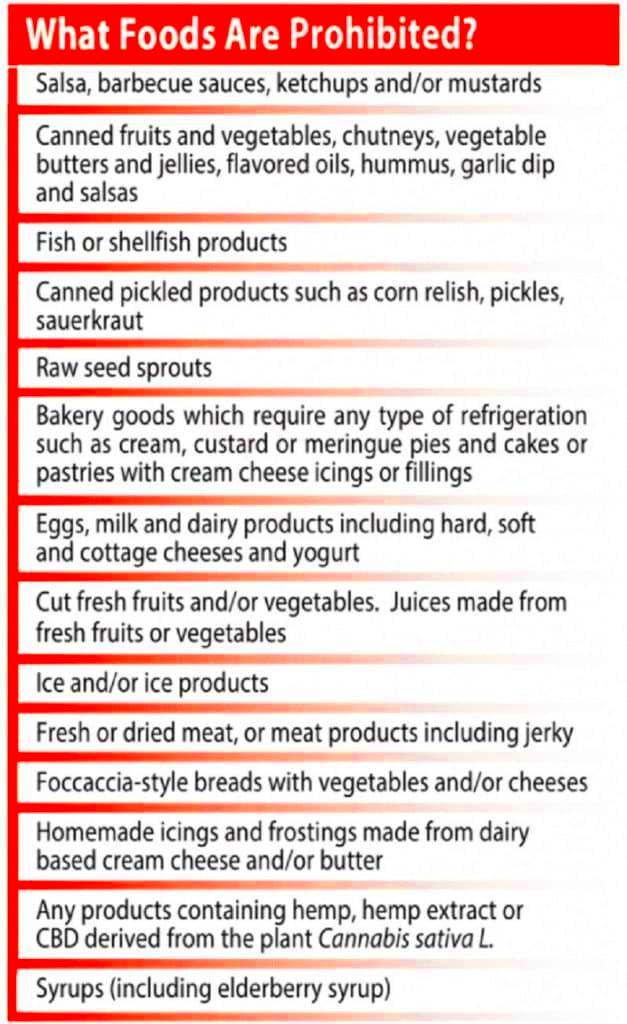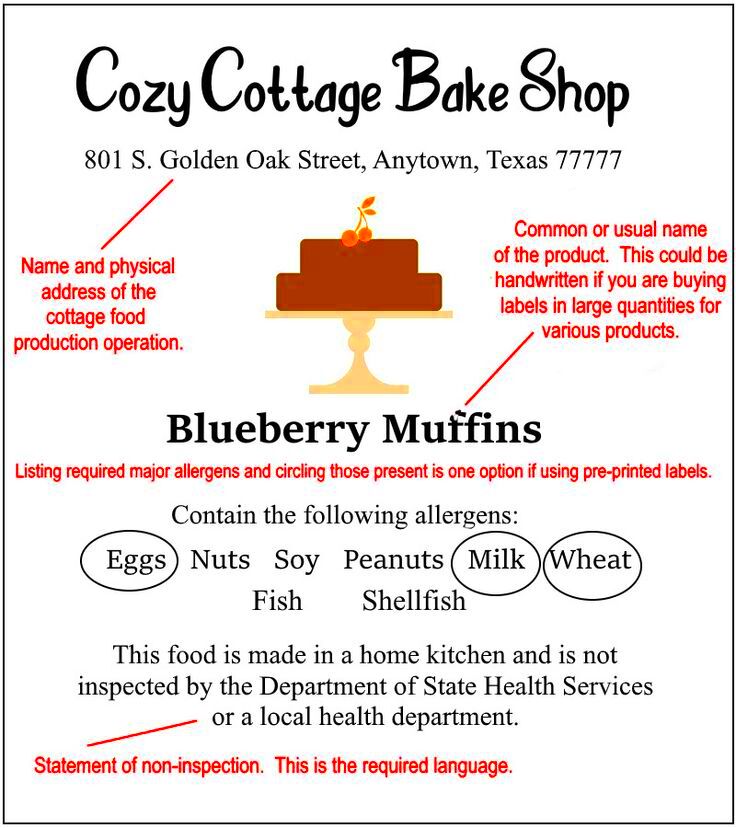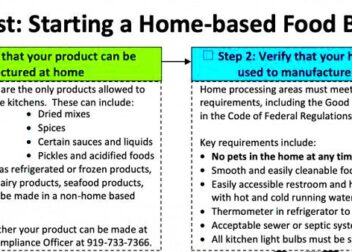Cottage Food Laws in Kansas What You Need to Know
Cottage food laws in Kansas allow individuals to prepare and sell certain food items made in their home kitchens. These laws are designed to support small-scale entrepreneurs while maintaining public health standards. Understanding the basics of these laws is essential if you want to start a home-based food business in Kansas. Let’s explore what qualifies as cottage foods and the requirements for selling them in the state.
What Are Cottage Foods?

Cottage foods refer to non-potentially hazardous foods that can be safely prepared in a home kitchen and sold directly to consumers. These foods do not require time or temperature controls for safety, which makes them safe for home production. Common examples include:
- Baked goods (such as cookies, cakes, and breads)
- Jams and jellies
- Honey
- Dry mixes (such as spice blends and baking mixes)
- Granola and trail mix
However, Kansas does not allow the sale of potentially hazardous foods, such as dairy-based products, meat, or items requiring refrigeration, under cottage food laws. Understanding the difference is crucial for staying compliant with state regulations.
Requirements for Selling Cottage Foods in Kansas
In Kansas, there are several requirements you must follow if you want to sell cottage foods. These include:
- Licensing: No license is required for selling cottage foods as long as you follow the rules.
- Sales Location: Cottage foods can be sold directly to consumers at places like farmers markets, fairs, or from your home.
- Labeling: All products must be properly labeled with information like the name of the food, your contact information, and a statement indicating that the food was made in a home kitchen.
While licensing is not needed, Kansas does expect producers to maintain clean and sanitary kitchen conditions. If you wish to expand beyond these limitations, you may need to explore additional permits or commercial kitchen space.
Licensing and Permit Rules for Cottage Food Businesses
In Kansas, the good news is that cottage food businesses do not require a formal license or permit, provided you comply with the state’s guidelines. This makes it easier for home-based food entrepreneurs to get started. However, there are a few important rules to be aware of:
- No License Requirement: As long as you are selling non-potentially hazardous foods (like baked goods, jams, and certain canned goods), you don’t need a food license. However, if you want to sell food that requires temperature control, a commercial license will be required.
- Sales Limits: Cottage food producers can only sell their products directly to the end consumer. This means that wholesale or retail store distribution is not allowed without additional licensing.
- Local Regulations: While the state does not require licensing, it’s essential to check with your local city or county government, as they may have specific rules or permits that apply to home-based food businesses.
If you plan to expand your business beyond the cottage food laws’ limits, you may need to consider getting a food processing license, using a commercial kitchen, or obtaining other permits.
Labeling Guidelines for Cottage Food Products
Proper labeling is critical for cottage food producers in Kansas. The state requires you to include specific information on every product you sell to inform consumers and ensure transparency. The following items must appear on your labels:
- Product Name: Clearly label what the product is (e.g., “Chocolate Chip Cookies”).
- Producer’s Information: Include your name and address so that customers know who made the product.
- Ingredients List: All ingredients must be listed in descending order by weight. This is especially important for people with allergies.
- Allergen Information: Highlight any common allergens such as nuts, eggs, dairy, or wheat.
- Disclaimer: A mandatory statement that says, “This product was made in a home kitchen not subject to state inspection.”
Labels should be easy to read and attached directly to the product or its packaging. Failure to comply with labeling rules can lead to fines or restrictions on selling your products.
Where Can You Sell Cottage Foods in Kansas?
Cottage food laws in Kansas allow you to sell your products in specific locations, as long as the sales occur directly between you and the consumer. Common places where you can sell your homemade goods include:
- Farmers Markets: A popular venue for cottage food producers, farmers markets offer a direct line to customers looking for fresh, local products.
- At Home: You can sell products directly from your home, either through local pickup or home delivery.
- Fairs and Festivals: Community events and local fairs provide an opportunity to reach a wider audience.
Online sales are allowed, but only if the transaction involves direct delivery or pickup by the customer. You cannot ship products across state lines under Kansas cottage food laws. Expanding your business beyond these direct-to-consumer venues may require additional permits or the use of a commercial kitchen.
Health and Safety Regulations for Cottage Food Operations
While Kansas cottage food businesses don’t require state inspections, you are still expected to follow basic health and safety practices to ensure your products are safe for consumers. These guidelines help prevent foodborne illnesses and maintain trust with your customers. Key health and safety regulations include:
- Sanitation: Your kitchen and any equipment used for food preparation must be kept clean. This includes regularly disinfecting surfaces, utensils, and appliances.
- Hand Washing: You must wash your hands thoroughly before handling food. Proper hygiene is crucial, especially when switching between tasks like handling raw ingredients and packaging products.
- Food Storage: Ingredients should be stored in a safe, clean environment, away from contaminants like chemicals or household pets.
- Separation of Work and Home: Keep your home food business separate from other household activities. For example, avoid cooking for personal use while preparing cottage food products.
- Ingredient Quality: Use fresh, high-quality ingredients to ensure the safety and quality of your final products.
While there’s no formal inspection, following these health practices is essential to prevent contamination and ensure the safety of your cottage food products.
Legal Risks and Protections for Cottage Food Producers
Running a cottage food business comes with legal risks, but there are also ways to protect yourself as a producer. Understanding these risks and having safeguards in place can help you avoid legal trouble. Here are some key considerations:
- Product Liability: If someone becomes ill after consuming your product, you could be held liable. Having liability insurance is a good idea to protect your business from potential lawsuits.
- Compliance with Labeling Laws: Failure to properly label your products could result in fines or restrictions on your ability to sell. Always ensure your labels meet Kansas requirements.
- Local Regulations: While Kansas has state-wide rules, local cities or counties may have additional requirements. Always check with local authorities to avoid unintentional violations.
Additionally, it’s wise to create a legal entity (like an LLC) to separate your personal assets from your business. This can provide a layer of protection in case of legal issues.
Frequently Asked Questions About Kansas Cottage Food Laws
Understanding the details of Kansas cottage food laws can be confusing. Below are some common questions people have when starting a cottage food business in the state:
1. Do I need a food license to sell cottage foods in Kansas?
No, you do not need a food license to sell non-potentially hazardous foods directly to consumers. However, if you want to sell foods that require refrigeration or temperature control, you will need a food processing license.
2. Can I sell cottage foods online?
Yes, you can sell cottage foods online, but only for direct delivery or in-person pickup by the consumer. Shipping across state lines is not allowed under Kansas cottage food laws.
3. Where can I sell my cottage food products?
You can sell your products at farmers markets, fairs, from your home, or any other venue where you sell directly to consumers. Wholesale distribution or selling through retail stores requires additional permits and licensing.
4. What types of foods can I sell under cottage food laws?
Cottage foods include non-potentially hazardous items like baked goods, jams, jellies, honey, and dry mixes. Foods that require refrigeration, such as dairy products and meats, cannot be sold under these laws.
5. Do I need to follow specific labeling rules?
Yes, Kansas requires cottage food products to have labels that include the product name, ingredients, producer’s name and address, allergen information, and a statement that the food was made in a home kitchen not subject to state inspection.
6. Can I use my home kitchen for both personal cooking and cottage food production?
Yes, but you must maintain a high level of cleanliness and separation between personal cooking and food production for sale. Cross-contamination should be avoided to ensure product safety.
Conclusion on Cottage Food Laws in Kansas
Kansas cottage food laws offer a great opportunity for home-based food entrepreneurs to start small and build their businesses without significant red tape. By understanding the basic requirements, such as no licensing for non-hazardous foods and clear labeling guidelines, you can easily comply with the state’s rules. However, staying on top of health practices and understanding the legal risks involved is essential for long-term success. Cottage food laws make it possible to pursue your passion for food while ensuring the safety of your customers and protecting your business.

